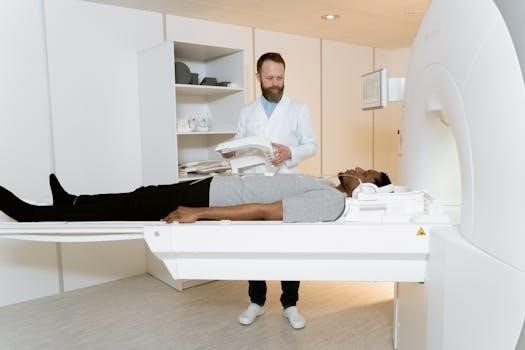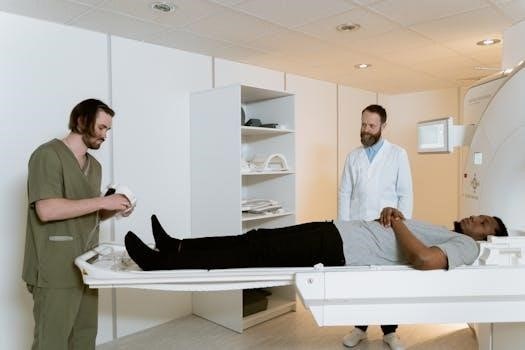Free MCAT Practice Tests Overview
Free MCAT practice tests are essential for comprehensive exam readiness. They provide timed practice, familiarizing you with question formats and pacing. These resources help with time management and identifying areas for improvement, vital for success.
Importance of Practice Tests
Practice tests are indispensable for MCAT preparation, serving as a cornerstone of effective study. They provide a realistic simulation of the actual exam, allowing you to familiarize yourself with the format, question types, and time constraints. Engaging with practice tests helps you identify your strengths and weaknesses, enabling you to focus your study efforts on areas needing improvement. Furthermore, these tests help in building crucial time management skills, crucial for success on the MCAT. By taking practice exams, you also become accustomed to the pressure of a timed testing environment, reducing anxiety on the test day. They are not just about testing knowledge but also about honing test-taking strategies, which can significantly impact your final score. Ultimately, regular practice tests are a crucial part of preparing for the MCAT and are essential for achieving your goal of medical school admission.

Benefits of Timed Practice
Timed practice is a crucial component of MCAT preparation, offering numerous benefits that contribute to overall exam readiness. By simulating the real exam’s time constraints, timed practice tests help you develop effective pacing strategies, ensuring you complete each section within the allotted time. This practice also helps you learn to manage test anxiety by replicating the pressure of the actual exam environment. Consistent timed practice allows you to identify areas where you tend to spend too much time, enabling you to adjust your approach accordingly. Furthermore, it enhances your ability to quickly process information and make informed decisions under pressure, crucial for success on the MCAT. Through timed tests, you refine your ability to prioritize questions and maximize your score. Regular timed practice helps you to build endurance and stamina, simulating the full-length exam experience, ultimately increasing your confidence.

Finding MCAT Practice Tests
Locating suitable MCAT practice tests involves exploring online resources and official AAMC materials. These provide diverse options, including free and paid resources to enhance your preparation effectively.
Free Online Resources
Numerous online platforms offer free MCAT practice tests, often in PDF format, with answers for self-assessment. These resources are invaluable for initial exposure to the exam’s structure and content. Many sites provide full-length practice exams, simulating the actual test environment. Access to these free tests enables students to gauge their strengths and weaknesses without financial commitment. Some platforms also include detailed explanations for each question, enhancing the learning process. Look for resources that mirror the official MCAT format and difficulty level. Additionally, podcasts, videos, and flashcards are available to supplement practice tests. These varied resources help create a well-rounded study plan. Free online tools also frequently include diagnostic tests to help you focus your studies. Make sure to utilize these resources effectively for comprehensive preparation.
Official AAMC Materials
The Association of American Medical Colleges (AAMC) provides the most authentic practice materials for the MCAT. These resources are designed to accurately reflect the exam’s content, format, and difficulty. Official AAMC materials include full-length practice tests that are essential for simulating the actual test-day experience. These practice exams often come with detailed explanations for each answer, offering valuable insights into the reasoning behind the correct responses. While some AAMC resources may require payment, they often offer free sample questions and practice tools. Utilizing AAMC materials is crucial for familiarizing yourself with the official exam format and scoring system. Accessing these materials early in your preparation can greatly impact your performance. Always prioritize AAMC resources for the most accurate representation of the MCAT.

Effective Use of Practice Tests
Utilizing practice tests effectively involves strategic timing and analysis. Diagnostic tests establish a baseline, mid-study checks track progress, and final exams simulate real conditions, aiding in overall MCAT preparation.
Diagnostic Test Purpose
The primary goal of an initial diagnostic MCAT practice test is to establish a baseline understanding of your current knowledge and skills. This first practice exam serves as a crucial starting point, offering insights into your strengths and weaknesses across various content areas. By taking a diagnostic test early in your study process, you gain clarity on the specific topics that require more attention and focused study. It helps you identify areas where you excel and areas where you need to improve, allowing you to tailor your study plan. This step is crucial for effective and efficient MCAT preparation. It provides a personalized roadmap for your studies, ensuring you allocate your time wisely.
Mid-Study Progress Check
A mid-study MCAT practice exam plays a vital role in monitoring your progress throughout your preparation. After dedicating time to studying and content review, this practice test acts as a checkpoint to evaluate your advancement from your initial diagnostic assessment. It allows you to see whether your study strategies have been effective and to identify any remaining weak areas that require further attention. This mid-study check provides a clear picture of how far you’ve come and what adjustments you might need to make. It helps you refine your study techniques and tailor your approach. It also confirms whether you’re on pace for test day, offering a chance to correct course if necessary.
Final Practice Exam Strategy
The final MCAT practice exam should be taken when you feel your studies are nearing completion and test day is approaching. This exam serves as a comprehensive rehearsal, simulating the real test conditions as closely as possible. The goal is to gauge your overall readiness and identify any remaining areas of concern. If you are still not comfortable with your results, consider that you need to keep studying and taking more practice tests. This final practice will help you refine your test-taking strategies and identify any potential issues with time management. Focus on your pacing and approach to the various question types. This final practice test will give you confidence on the real test day.

Content and Format
MCAT practice tests mirror the real exam’s format, difficulty, and content, ensuring realistic preparation. These tests cover all subjects on the MCAT, including biological and physical sciences, verbal reasoning, and critical analysis skills.
Simulating Real Exam Conditions
To effectively prepare for the MCAT, practice tests should closely replicate the actual exam environment. This involves not only the content but also the format, timing, and user interface. Mimicking the computer-based testing platform is crucial, as it allows students to become comfortable with the digital interface and navigation tools. Furthermore, the pacing and time constraints of practice tests should align with the real MCAT. This familiarizes students with the pressure of timed sections and helps them refine their time-management skills. By replicating these conditions, students can develop the necessary stamina and strategy for test day. The goal is to make the actual MCAT feel less like a new and intimidating experience and more like a familiar practice session, reducing anxiety and improving performance. This includes the length of the test, the break periods, and the overall flow of the exam, contributing to a more accurate assessment of readiness.
Content Coverage of MCAT
MCAT practice tests should comprehensively cover the various content areas tested on the actual exam. This includes the natural sciences, such as biology, chemistry, organic chemistry, and physics, as well as the social and behavioral sciences, encompassing psychology and sociology. Furthermore, the critical analysis and reasoning skills (CARS) section requires practice with passages and questions that simulate the real test. A good practice test will present questions from all these areas, reflecting the distribution and depth of content you will encounter on the official MCAT. Additionally, the tests should assess not only recall of factual knowledge but also the ability to analyze, interpret, and apply that knowledge in novel situations. Therefore, when selecting practice materials, ensure they include a wide variety of questions across all relevant disciplines, enabling you to identify your strengths and weaknesses. Comprehensive content coverage is essential for a well-rounded preparation experience.
